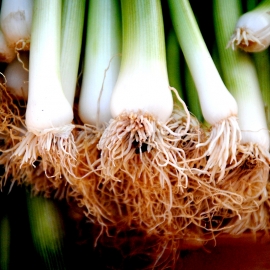



«Titan» - Organic Welsh Onion Seeds
1.14 €
Titan often grown as an annual. 60-90 days from seeding to cutting. (Welsh Green Onion, Bunching Onion, Spring Onion) Titan, harvestable at any growing stage, despite their name native to Ukraine, and heirloom monocot.
-
Organic Welsh Onion «Titan»
Titan often grown as an annual. 60-90 days from seeding to cutting. (Welsh Green Onion, Bunching Onion, Spring Onion) Titan, harvestable at any growing stage, despite their name native to Ukraine, and heirloom monocot.
The long stalks are thin, white, and mild-flavored. You can encourage more juicy whiteness by mounding soil up around the plants as they grow. Plants prefer rich soil in the sunny garden. Sow seed in fall or spring by sprinkling into the furrow and barely covering with soil, then tamping well and keeping evenly moist and warm until germination, which takes a week to 10 days. If you grow the onions in a flat, the tops may be cut back several times with a few weeks growth in-between, to encourage a thicker stem for ease of transplant. Transplant to garden at 12 inches apart between plants and 2 feet between the rows. These will bush up into comely clumps, harvestable, edible, there when needed.
How to Grow
Plant Welsh onion seeds indoors in March, using a regular commercial potting soil. Keep the soil lightly moist until the seeds germinate, which generally takes seven to 10 days.
Plant the seedlings in your garden after about a month, when all danger of frost has passed. Full sun is best, but Welsh onion plants tolerate a bit of light shade. Allow about 8 inches between each seedling. If you have access to established plants, you can easily propagate new plants by division. Simply dig up clumps and pull them into individual bulbs, then replant the bulbs in soil that has been cultivated ahead of time. Dig an inch or two of compost into the soil to get the plants off to a good start.
Welsh onion plants are remarkably trouble free. The plants benefit from regular irrigation, especially during hot, dry weather, but they are relatively drought tolerant. No fertilizer is required, especially if you add compost to the soil at planting time. However, if your soil is poor or growth appears stunted, provide a light application of 5-10-5 fertilizer once a year, in early spring.
